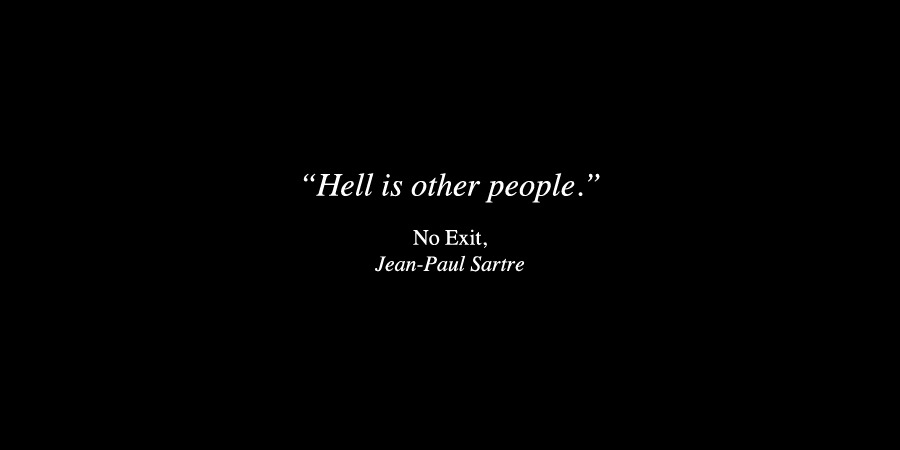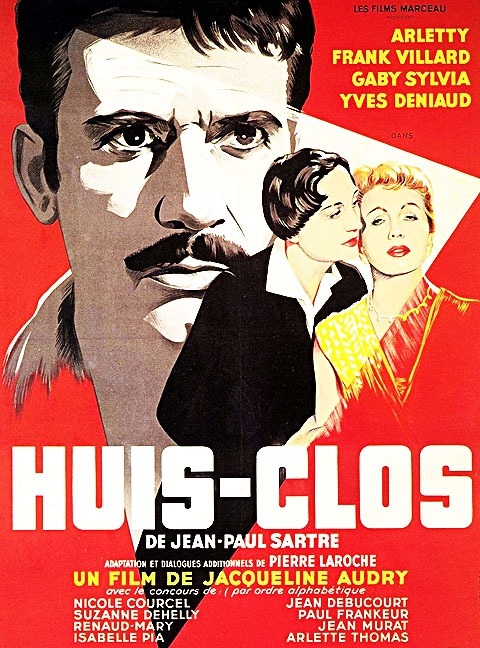
In Sartre's "Huis Clos" aka "No Exit", Sartre's famous remark from the translated edition, Hell is other people, does not necessarily mean that the mere presence of other people, of living in a interdependent world is comparable to the fiery pits of Satan's domain.
However, in the particular case of Joseph Garcin, Ines Serrano, and Estelle Rigault, three damned souls who are transported to what they believe to be Hell in the after life--they are trying to figure out exactly what their torture will consist of and what the others in the room have been condemned for.

In the process of discovering the others, each of the three characters begin to spiral into their inner most secrets. Into the sins that brought them to hell. They draw out the worst in one another and begin to slowly fade out from any connection to their time on earth. As each character is forgotten by someone still alive, their tenuous link to their mortality is extinguished slowly. In the closing, Joseph remarks that the real torture was not to come from devices or physical punishment--but from the other two people. Joseph doomed to want Estelle to love him for himself and to think of him as a man, not a coward. Estelle miserably feigns attraction to get Joseph to give her affection. Ines is so deep in her despair and bitterness that she wrecks Estelle's attempts to seduce Joseph and out of spite, will cause misery to Joseph for all of eternity.
This need to be heard, recognized, understood, loved, admired, adored, championed. What are the correlations between the excruciating, hyper-focus on how others see us and our relationship to ourselves? In what ways can Sartre's play serve us in the 21st century?
According to a 2013 eMarketer report, "Worldwide Social Network Users: 2013 Forecast and Comparative Estimates," nearly one in four people worldwide will use social networks in 2013. The number of social network users around the world will rise from 1.47 billion in 2012 to 1.73 billion this year, an 18% increase.
1.73 billion. That is quite a number. Many of my peers and I have grown up with a constant internet connection. With the advent of social networks, from Xanga, LiveJournal, forums, instant messenger, Myspace, etc., there has never been a time since I was 11 years old that I did not have an internet alias of some sort. Where I was not able to talk with real life friends online or create friends over the internet. With the success of Facebook in uniting hold classmates, lovers, grandparents and frenemies, the change of social networking to become less about personal expression and more about social recognition and one-upmanship has more common.

I remember talking to my roommate about how the constant news-feeds, timelines, etc of Instagram, Facebook, Twitter and Snapchat were frustrating and exhaustive. She agreed and also added that she personally never felt the need to express genuine emotions on those sites. She would rather paint a portrait of success and positivity because others do not deserve the complexity of her truths or her life. What some may deem as inauthentic, she categorized as privacy and ownership of her personal narrative.
But what of this performance of positivity that seems to dominate the way young adults use social media? Sure there are countless outliers persistently paving the way to bring about a more authentic and multifaceted engagement with social media (those who are open about their personal struggles or triumphs with mental illness, financial hardships, activism, etc), but the overwhelming manner way to use these platforms of communication is - to put it like Elsa from Frozen- conceal and not feel.
The bombardment of other people's life news, of their engagements, and job promotions, their graduations and baby showers-- of writing countless happy birthdays because you logged in on the right day and Facebook reminded you, of sharing videos of hope and resilience, of constantly curbing our less savory emotions in order to paint a portrait of health, wealth and thriving success in order to show others that, yes we are doing well, everything is ok, I am doing better than you. All of this creates a constricting and suffocating dimension to logging in to see what's new. It is a false reality that may create resentment with social media as a whole. With the need to be constantly updated and to continue a charade of letting folks "keep up" with your life.
FOMO (Fear of Missing Out) becomes a permanent part of our psyche as we scroll through glossy travel photo after travel photo. We disingenuously like celebratory status after status in order to perform goodness. But the opposite, of deciding to reject the politics of recognition, of not seeking the approval of others and their definitions of who we are, is unfathomable as of now. There is a long ways to go until a healthy relationship can be formed between us and these totems of representation, of these avatars of our souls that exist in small profile pictures.
If Hell is other people, and other people are now one swipe away, then can we say hell is social media?

While reading your post, I imagined "No Exit" in the setting of Facebook: three people whose only Friends are each other. Actually, maybe that would negate the purpose of Facebook as a social media platform, or maybe it would just intensify it.
ReplyDeleteI remember thinking some time last year (in the midst of recruiting season...and by "season," I mean the entire school year) that social media is dead, or dying. Facebook has had to evolve in order to reassert its utility as more than just a news feed: it now serves as an alternative to texting and calling, a political and news platform, and a way to keep up with artists and brands.
At the same time, the role of one's social media profile is even more permanently established in our daily lives. Relating back to Sartre's notion of existence preceding essence, our essence is now defined by our online statistics: how many likes, messages, comments, etc., that we get. And just as Garcin and Ines try to justify their existence by looking at their past on earth, we constantly check our notifications and friend's activity on our posts to confirm our existence; the past is being reiterated all the time, facilitated by Facebook's news feed engine and its "1 year ago today" feature. It's like we can't tell how we feel about something, including and especially ourselves, unless it's been legitimized by the reactions of others.
Of course, this makes Facebook and social media sound evil, but really maybe it's just us. Maybe Hell isn't other people, or social media, it's just ourself. We're the ones who ultimately have to reclaim our autonomy and our suffering, but we can't because we're looking for instant gratification, which is an instinct.
P.S. I never knew YouTube's icon used to look like that.